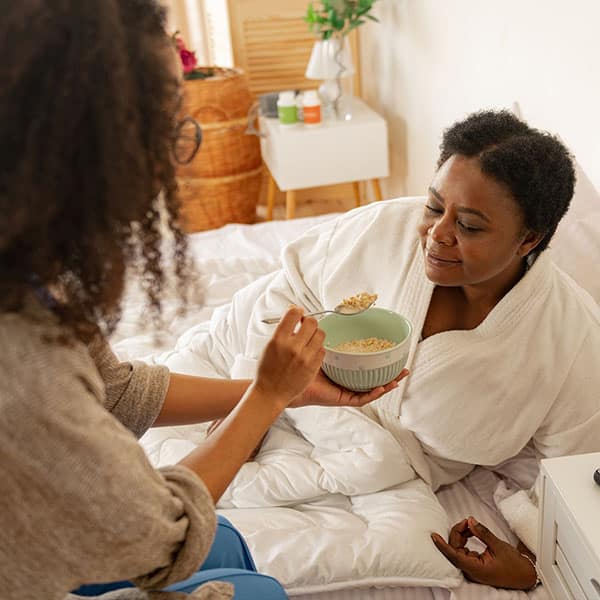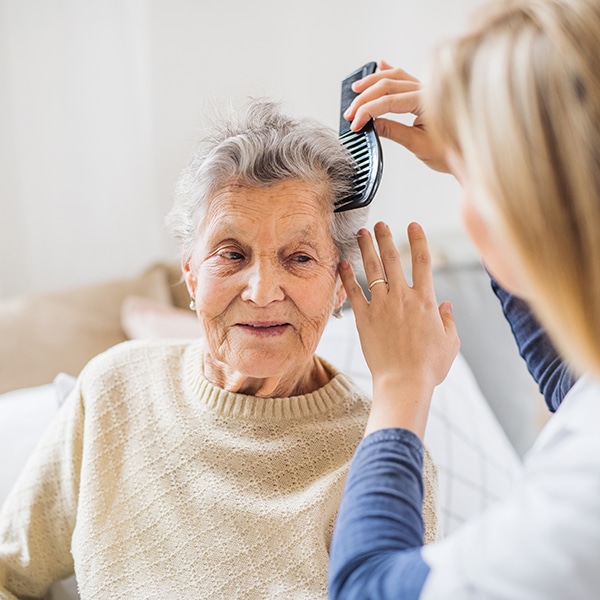Connect Our Elders, in addition to believing so strongly in direct to consumer education, partners with home care agencies, care managers, senior housing placement processionals (not direct to communities as we believe families deserve to have the on-ground experts facilitating tours to various communities and the on-ground placement professionals truly understand the differentiators of each community option), legal/financial professionals so as to help Elders and their inner circle navigate and get connected to experts in each area.
It is not often families understand clearly what’s needed to adequately support their loved one in the aging experience and Connect Our Elders is here to provide empathetic, proactive education and navigation through the many resources that exist. Simply providing a list of resources to these families is not adequate. It does nothing to reduce overwhelm. However, making a confident, professional, direct recommendation does.
Personal care services allow older adults to age in place while living with physical disabilities or a chronic health condition. These types of homecare include help with personal activities, such as dressing and bathing. Seniors who receive private or personal homecare can maintain their independence and continue living at home.
Personal care is one of the most common types of senior home care. Generally, this type of care involves a combination of tasks and activities that are designed to ensure safety, comfort, and well-being for individuals with chronic health conditions or physical disabilities. Care will typically include things like bathing an elderly person when they cannot do it themselves or providing assistance so someone can safely complete daily living skills, such as dressing themselves after surgery.

Caregivers come to the home to assist with bathing, dressing, toileting, grooming, feeding, transferring, and more.
Personal Care
One of the cornerstones to healthy living is having a personal caregiver assist with Activities of Daily Living, also known as ADLs. These tasks include dressing, grooming oneself, and bathing, which can be done by an experienced caregiver that will provide mobility and transfer assistance too.
Personal caregivers can offer home help with many different tasks, including errands, meal preparation, light housekeeping and medication reminders. Our caregivers also provide companionship to offset the risks of senior isolation.
Holly Slade is a compassionate senior care advisor and sounding board. She enjoys connecting with seniors and their loved ones, carefully listens to the needs, goals and concerns of her clients and provides care options and resources.
When you need home care for your aging loved one, it can be challenging deciding what type of service will work best. Companion care services tend to focus on social needs while personal-care services emphasize medical and physical needs.
When choosing elder care, the difference between companion and personal is an important consideration in the decision process as they both provide different benefits based on a person’s individualized requirements.
Home care companions can do your laundry, make you a delicious meal that’s not just microwaved leftovers from the night before, and help out with errands like grocery shopping. They also provide emotional support to those who are grieving or struggling in their day-to-day lives due to illness or disability.
There are many reasons why we may recommend personal care services. Personal care is provided for those who require direct physical assistance due to a chronic health condition or some other circumstance that limits their ability to bathe and dress themselves, feed themselves, etc.
If your loved one has difficulty with these tasks but does not need help from another person in order to complete them successfully on his/her own, then companion care might be more appropriate- it provides companionship so the individual can enjoy life’s activities without needing constant supervision; this type of service also includes meal preparation and light housekeeping duties like laundry if needed.
Homemaking
Companionship
Transportation
Additional Services
If your family member needs only assistance with homemaker or personal services, or companion care, Medicare will not cover the cost.
Medicare doesn’t pay for:
Navigating senior care options can be difficult, especially if you live in a different area from your loved ones. Our Care Navigators will educate you, and aid in your process of locating and deciding on which care meets your needs.
Connect Our Elders helps you to decide what the right choice is based on geographic location, care needs, urgency, individualized characteristics of your loved one, you, and the possible caregiving agencies.






Connect Our Elders is a trusted resource in making difficult, crucial decisions regarding care planning and care options for yourself and/or your loved one. These decisions fall into several categories:

It is not often families understand clearly what’s needed to adequately support their loved one in the aging experience and Connect Our Elders is here to provide empathetic, proactive education and navigation through the many resources that exist. Working with Connect Our Elders as your navigator reduces overwhelm, stress, fear of the unknown creating space for you to focus your energy on your relationship with your loved one rather than becoming a full-on student having to learn the eldercare industry, being a caregiver, or a care manager. Be present in your relationship with your loved one and let Connect Our Elders do the rest.
Be present in your relationship with your loved ones, let us be your Care Navigator. Connect with us for a FREE comprehensive phone assessment.